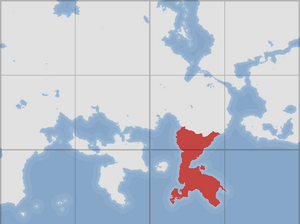Greater Tralka
This article is incomplete because it is pending further input from participants, or it is a work-in-progress by one author. Please comment on this article's talk page to share your input, comments and questions. Note: To contribute to this article, you may need to seek help from the author(s) of this page. |
The Greater Tralkan Protectorate | |
|---|---|
|
Flag | |
| Motto: "In Defense of the People." | |
| Capital and largest city | Vieskov |
| Official languages | Standard Tralkan |
| Recognised regional languages | Cezskan Torovskan Voldinan |
| Demonym(s) | Tralkan |
| Government | Constitutional Stratocracy |
• Grand Marshal | Alois Pacek |
| Legislature | Assembly of Public Policy |
| Area | |
• | 217,152 km2 (83,843 sq mi) |
| Population | |
• 2021 estimate | 27,589,161 |
• 2020 census | 26,275,392 |
• Density | 121/km2 (313.4/sq mi) |
| GDP (PPP) | 2020 estimate |
• Total | $1.215 trillion |
• Per capita | $46,260 |
| GDP (nominal) | 2020 estimate |
• Total | $983.304 billion |
• Per capita | $37,423 |
| Currency | Tralkan Kroner (GTK) |
Greater Tralka is a stratocracy in southern Thrismari. It borders Lyonheimer to the north.
Government
The government of Greater Tralka is a form of constitutional stratocracy, where the military performs the functions of state, but the power of that state is bound by a charter. This charter acts as a de facto constitution, outlining both the structure and limitations of the government, separating powers into different assemblies of senior officers, and guaranteeing extensive civil and human rights for the citizens of Greater Tralka.
Membership into its decision making, executive, and judicial bodies is exclusive to military officers, and is contingent on aptitude, acceptance by existing members of the respective bodies, and knowledge of the operating charter.
Economy
Greater Tralka has a social market economy, with the right to private property being guaranteed by the Tralkan Charter. However, the charter allows the Assembly of Public Policy to regulate the economy as needed through taxes, subsidies, and public spending, and economic policy has become one of the most contested topics in Tralkan politics.

